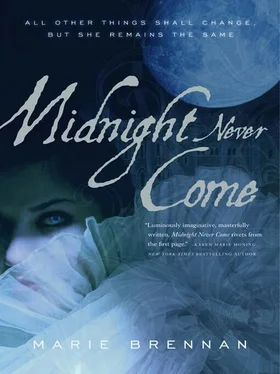He hung from the crenellations, gasping for air, with the rain sending rivers of water through his hair and clothes to puddle in his boots.
His left shoulder and hand ached from the force of stopping his fall, but Deven dragged himself upward, grunting with effort, until at last he could hook one foot over the bricks and get his body past the edge. Then he collapsed in the narrow wedge where the pitch of the roof met the low wall of the crenellations and let himself realize he wasn’t about to fall to his death.
The stranger.
Deven twisted to look over the wall, onto the roof of the chambers where Elizabeth listened to the virginals. He saw no sign of the intruder anywhere on the rain-streaked lead, and no hatches hung open in the turrets that studded the corners of the extension; through the grumble of the storm, he heard a faint strain of music. But that meant nothing save that no one had been hurt yet.
Even if Deven could have made the jump down, he could not burst in on the Queen, soaked to the bone and with his doublet torn, its stuffing leaking out like white cotton entrails. He hauled himself to his feet, wincing as his bruised knees flared, and began his limping progress back along the Long Gallery, to the door that had led him up there to begin with.
His news, predictably, caused a terrible uproar, and soon a great many people were roused out of bed, but the intruder had vanished without a trace. Some time later, no longer dripping but still considerably damp, Deven found himself having to relate the story to Lord Hunsdon, from his arrival at Hampton Court that night up to the present moment.
“You saw nothing of his face?” Hunsdon asked, fingers tapping a worried beat on the desk before him.
Deven was forced to shake his head. “He wore a cap low on his head, and we stood some ways apart, with only one candle for light. He seemed a smallish fellow, and dressed more like a laborer than a gentleman, but beyond that I cannot say.”
“Where do you think he went, after you lost him?”
The chambers there connected at their corner to the courtiers’ lodgings that ringed the Base Court; from there, the man might have run nearly anywhere, though the soaring height of the Great Hall would have forced him to circumnavigate the courtyard if he wished to go somewhere else. There was no good access to the ground; everything was at least two stories. With rope, he might have gone through a second-floor window, but they found no such rope, nor sign of a very wet man coming in anywhere.
The last Deven had seen of the man was when they reached the end of the gallery, and the stranger… leapt over the edge.
No, not quite. The man had leapt, yes, but upward, into the air — not as a man would jump if he intended a landing on a pitched roof below.
After that, his memory only offered him the flapping of wings.
He shook his head again, shivering in his damp, uncomfortable clothes. “I do not know, my lord. Out into the gardens, perhaps, and from thence into the Thames. Or perhaps there was a boat waiting for him.” How he would have gotten from a second- or third-floor roof to the gardens, Deven could not say, but he had no better explanation to offer.
Nor, it seemed, did Hunsdon. The baron’s mouth was set in a grim line. “It seems the Queen is safe for now. But we shall stay alert for future trouble. If you see the fellow again…”
Deven nodded. “I understand, my lord.” He might walk past the man in the street and not know him. But Deven believed now, as he had not truly before, that the Queen’s enemies might stage threats against her life. His duty was more than simply to stand at her door with a gold-covered ax.
He prayed such a threat would not come again. But if it did, then next time, he would be more effective in stopping it.
MEMORY: July 12, 1574
The sleeping man lay in an untidy sprawl on his bed. The covers, kicked aside some time earlier, disclosed an aging body, a sagging belly usually hidden by the peasecod front of his doublets, and his dark hair was thinning. He was still fit enough — not half so far gone as some other courtiers — but the years were beginning to tell on him.
In his mind, though, in his dreams, he was still the young man he had been a decade or two before.
Which suited very well the purposes of the being that came to visit him that night.
How it slipped in, no observer could have said. Under the edge of the door, perhaps, or out of the very stuff of shadows. It showed first as a stirring in the air, that coalesced into an indistinct shape, which drifted gently through the chamber until it reached the bed.
Hovering over the sleeping man, the figure took more distinct shape and color. A fluttering linen chemise, freed from the constraints of bodice and kirtle and the usual court finery. Auburn hair, flowing loose, its tips not quite brushing the man below. A high forehead, and carmined lips that parted in an inviting smile.
The man sighed and relaxed deeper into his dream.
Robert Dudley was hunting, riding at a swift canter through open fields, pursuing hounds that gave the belling cry of prey sighted. At his side rode a woman, a red-haired woman. He thought, faintly, that she had been someone else a moment ago — surely it was so — but now she was younger, her hair a darker shade of red.
And they were not riding, they were walking, and the hounds had vanished. A pleasant stream laughed to itself, hidden somewhere in the reeds to one side. The sunlight was warm, casting green-gold light down through the trees; up ahead the landscape opened into a grassy meadow, with something in it. A structure. A bower.
Curtains fluttered invitingly around the bed that stood within.
Clothing vanished at a thought, leaving skin upon skin, and together they tumbled into bed. Auburn hair cascaded around him, a second curtain, and Robert Dudley gazed adoringly into the face of Lettice Knollys, all logic and reason crumbling before the onslaught of passion that overwhelmed him.
Easy enough, to fan the flames of an early flirtation into a conflagration. He would not remember this upon waking, not as anything more than an indistinct dream, but it would serve its purpose nonetheless. And if Lettice Knollys were in truth Lettice Devereux, Lady Hereford, and wed elsewhere, it did not matter. Dudley did not have to marry her. He had only to give his heart, turning it from the target at which it had ever been fixed: his beloved Queen Elizabeth.
Robert Dudley, Earl of Leicester, moaned deep in his throat as he writhed on the bed, aware of nothing but the dream that suffused his mind. Above him hovered the ghostly form of Lettice Knollys, perfect as she had never been, even in the blossom of her youth.
The scholars of Europe spoke of demons they called succubi. But more than one kind of creature in the world wielded such power, and not all served the devil.
Some served a faerie Queen, and did her bidding with pleasure, dividing from the mortal Queen her most loyal and steadfast admirer.
A man might die of such surfeit. The ghostly figure lost its definition, fading once more into indistinct mist, and with an unfulfilled sigh the Earl of Leicester subsided into dreamless sleep.
There would be other nights. The creature that visited him considered itself an artist. It would work upon him by slow degrees, building his desire until he thought of no one else. And when his heart turned away from the mortal Queen, and the creature’s work here was done….
There would be other mortals. Invidiana always had use for this creature’s talents.
WHITEHALL PALACE, WESTMINSTER: November 3, 1588
Deven stood in front of the polished mirror and ran one hand over his jaw, checking for stubble. Colsey had shaved him that morning, and his hair was newly trimmed into one of the more subdued styles currently fashionable; he wore a rose-red doublet with a falling collar, collected from the tailor only yesterday when the court completed its move into Whitehall, and even his low shoes were laced with silk ribbons. He looked better than he had when he was first presented to the Queen, but felt very nearly as inadequate.
Читать дальше












